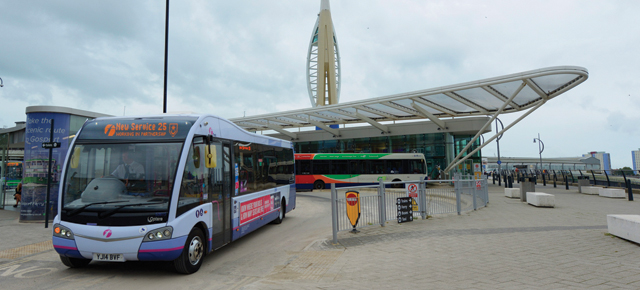Supported by £48m from the Department for Transport, the Bus Service Improvement Plan will fund new tickets, cut fares and speed up journeys

The city of Portsmouth could become the poster child of the government’s National Bus Strategy for England. The city discovered in April that it would receive £48.3m to support the delivery of its Bus Service Improvement Plan – the second largest award outside of a combined authority area. This money will be used to help the city ‘Bus Back Better’ through a combination of new tickets, lower fares and bus priority measures.
Peter Shelley, Portsmouth City Council’s rapid transit development manager, provided further details at the first of a new series of BRT uk Lunchtime Masterclasses earlier this month. He explained how the council was able to build on a proven record of effective partnership working with bus operators, neighbouring authorities and the Department for Transport.
Fares are a central component of the BSIP and are expected to deliver some quick wins. Tap-on, tap-off ticketing will simplify and speed up travel. There will be lower fares for certain groups, valid on all First and Stagecoach buses. Reduced fares for young people will now be extended from those aged to 16 to those aged up to 19, and a new all-operator, family day ticket will be offered. Other new products include an all-operator, 90-minute ‘Hopper’ ticket and a cheap evening rover ticket valid after 7pm.
However, Shelley said that the element of the BSIP that the Department for Transport is most interested in is its new bus priority measures. This builds on the positive experience of the A3 Bus Priority Corridor (ZIP), which links Portsmouth with Horndean and Waterlooville in Hampshire. It opened in 2008 at a cost of £34.5m and Shelley revealed that it’s the only corridor in Portsmouth where bus times are quicker than they were 20 years ago.
The BSIP includes 2.4km of new bus lanes, building on the 9.8km that are already in place. Existing bus lanes will be resurfaced to reinforce importance, and they will be supported by new camera enforcement, dedicated bus lane civil enforcement officers and a tow-away scheme.
A wider rollout of smart traffic signals will help deliver better bus journey times. “These can be really effective on a very confined network like Portsea Island,” Shelley explained. “And let’s be honest, they are less contentious.”
These measures and others are expected to deliver a 10% reduction in bus journey times by 2025/26.
Other enhancements in the BSIP include better stop design, real time information at every bus stop, earlier morning journeys from 4.30am and late Friday and Saturday buses until 1am, and demand responsive transport.
Reflect the priorities that their residents raise with them, and change your proposals if needed. Keep them close. Don’t assume that because they liked an idea last year they will like it now. Learn from your mistakes. And no surprises – keep them informed every step of the way
Shelley explained that he and his colleagues had consulted with residents to obtain a mandate for action. Offering advice to dealing with local politicians, he said: “Reflect the priorities that their residents raise with them, and change your proposals if needed. Keep them close. Don’t assume that because they liked an idea last year they will like it now. Learn from your mistakes. And no surprises – keep them informed every step of the way.”
You would be forgiven for expecting such a comprehensive package of measures to deliver a surge in new users, but Portsmouth is only expecting passenger numbers in 2025/26 to match pre-Covid levels (12 million). In percentage terms, patronage is currently in the low eighties of what it was back then.
“We worked closely with the operators on this,” Shelley explained. “We didn’t want something that was eye-catching but undeliverable and we’ve got a long way to go really to get back to 2019/20 targets. So we said the target is 100% [of pre-Covid patronage] and a stretch target is 110%.”
LUNCHTIME MASTERCLASSES, sponsored by Atkins
May 19: Peter Shelley of Portsmouth City Council on Bus Service Improvement Plans. ‘Be careful what you wish for!’
May 26: Angela Hosford of Transport for West Midlands on Sprint.
June 9: Tony Brown of Atkins on ‘Intelligent Bus Priority’.
June 16: Liz Helen Rosenkilda Christensen on ‘Busveien’, 50kms of busway in Stavanger region of Norway.
June 23: Thomas Ableman, director of innovation at Transport for London, asks ‘Why Innovation?’
June 30: Shane Hymers of Kent County Council on Fastrack.
July 7: Robert Montgomery of Busesreinvented.com discusses ‘UK Bus: Delivering the promised land – sharing the spend and the spoils.’
ABOUT BRTuk
BRTuk has members from across the industry, including operators, promoters, manufacturers and consultants. It serves as an information hub and engages with all levels of government. Visit: www.brtuk.com
This article appears in the latest issue of Passenger Transport.
DON’T MISS OUT – GET YOUR COPY! – click here to subscribe!








